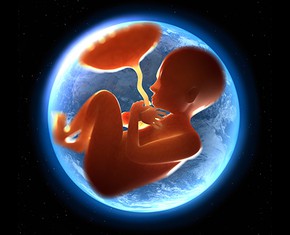The views expressed in our content reflect individual perspectives and do not represent the authoritative views of the Baha'i Faith.
Our ancestors evolved as hunters and gatherers—for hundreds of thousands of years, prehistoric humans spent their lives searching for food.
Long before farming or agrarian cultures ever existed, we constantly hunted and gathered, because food wasn’t always abundant, and sometimes wasn’t available at all. That means, scientists say, that people would fast involuntarily—and then, when they found food, they would feast. Because of those evolutionary conditions, humans gradually evolved a genetic code, a genotype, which allowed their bodies to thrive by adapting to those cycles of feasting and fasting.
That’s the reason a healthy, well-nourished person can survive for weeks without eating. Dr. Alan Lieberson, in a 2012 Scientific American article, pointed out many instances of those who have stopped eating for extended periods of time, including the well-known case of Mahatma Gandhi, who at the age of 74 went on a 21-day hunger strike to protest his detention without charges by the British authorities in India. Gandhi survived, and lived for several more years.
We all still carry that feast-or-famine genetic code, even though most cultures in the developed world now eat more consistently, consuming two or three or even four regular meals each day, plus snacks and desserts, without fail or respite. As a result, our digestive tracts stay full most of the time, unable to allow our bodies to experience the beneficial effects of temporary emptiness and the natural cleansing process it creates.
Accordingly, recent scientific research has found that intermittent fasting can help us remain healthier longer. Multiple research studies have demonstrated the health benefits of various intermittent patterns of fasting, caloric restriction and voluntary abstinence. Because these patterns can replicate the feast-or-famine diet of our ancestors, many researchers have now recognized the advantages of periodically emptying the human digestive system, and allowing it to rest, self-cleanse and purify without the constant presence of food.
Have you ever fasted? Baha’is fast for 19 days every year, abstaining from food and drink during the daytime, and only eating and drinking during the nighttime hours. Of course, going without food and drink for 12 hours, and repeating the process nineteen times, can have a profound effect on the mind, the heart and the soul—and this kind of cyclical intermittent fasting, it turns out, also has significant physical benefits.
But as the Baha’i writings themselves point out, those who’ve tried this practice know it isn’t easy:
Even though outwardly the Fast is difficult and toilsome, yet inwardly it is bounty and tranquillity. – Baha’u’llah, quoted in The Importance of Obligatory Prayer and Fasting, # XVI.
So while the Baha’i Fast has a primarily spiritual purpose—which we’ll discuss in subsequent essays in this series—it also has powerfully beneficial physical ones, too. Medical science has shown that cyclical intermittent fasting:
- decreases blood sugar levels and insulin resistance,
- fights inflammation,
- enhances heart health by reducing cholesterol and triglycerides,
- boosts brain function and prevents neurodegenerative diseases like Alzheimer’s and Parkinson’s,
- increases metabolism and helps control weight,
- increases levels of human growth hormone (HGH), a key factor in growth and muscle strength,
- aids in cancer prevention, and
- delays aging and extends longevity.
This all makes sense, if you think about it. Allowing our digestive system the opportunity to rest and cleanse itself for many days in a row once a year mirrors the practice of a wise farmer who lets a field lie fallow for a season. When a field lies fallow, the soil replenishes itself while undergoing a natural process of rest and regeneration, much like cells in our bodies do when we fast intermittently. This cleansing physical process reflects the spiritual cleansing all holy scriptures urge us to undertake:
To be pure and holy in all things is an attribute of the consecrated soul and a necessary characteristic of the unenslaved mind. The best of perfections is immaculacy and the freeing of oneself from every defect. Once the individual is, in every respect, cleansed and purified, then will he become a focal centre reflecting the Manifest Light. – Abdu’l-Baha, Selections from the Writings of Abdu’l-Baha, p. 146.
The scientific studies of intermittent fasting show that a regular pattern of calorie restriction, in which people reduce their routine intake of nutrients with a recurring fast, can deliver some very significant benefits. Intermittent fasting reduces risk factors for multiple chronic diseases in animals and humans, and it dramatically increases life span in several animal studies:
Religions have long maintained that fasting is good for the soul, but its bodily benefits were not widely recognized until the early 1900s, when doctors began recommending it to treat various disorders—such as diabetes, obesity and epilepsy.
Related research on calorie restriction took off in the 1930s, after Cornell University nutritionist Clive McCay discovered that rats subjected to stringent daily dieting from an early age lived longer and were less likely to develop cancer and other diseases as they aged, compared with animals that ate at will. Research on calorie restriction and periodic fasting intersected in 1945, when University of Chicago scientists reported that alternate-day feeding extended the life span of rats as much as daily dieting in McCay’s earlier experiments. Moreover, intermittent fasting “seems to delay the development of the disorders that lead to death,” the Chicago researchers wrote. – David Stipp, “How Intermittent Fasting Might Help You Live a Longer and Healthier Life,” Scientific American, January 2013.
Scientists now understand that people who regularly fast can considerably extend their lifespans, as well as reduce the chronic physical and mental illnesses common in old age. Documented public health studies have shown, in areas where much of the population has a consistent religious practice of fasting, that those populations live longer, healthier lives.
Research studies have indicated that these positive effects come about because fasting also ramps up the process known as autophagy, a kind of recycling system in cells that gets rid of damaged molecules, including ones that have been previously tied to Alzheimer’s, Parkinson’s and other neurological diseases.
So for the physical benefits alone, you might want to try fasting with the Baha’is this year. It will challenge you, but it will also open up your body and your soul to an entirely new realm of possibilities.
















Comments
Sign in or create an account
Continue with Googleor